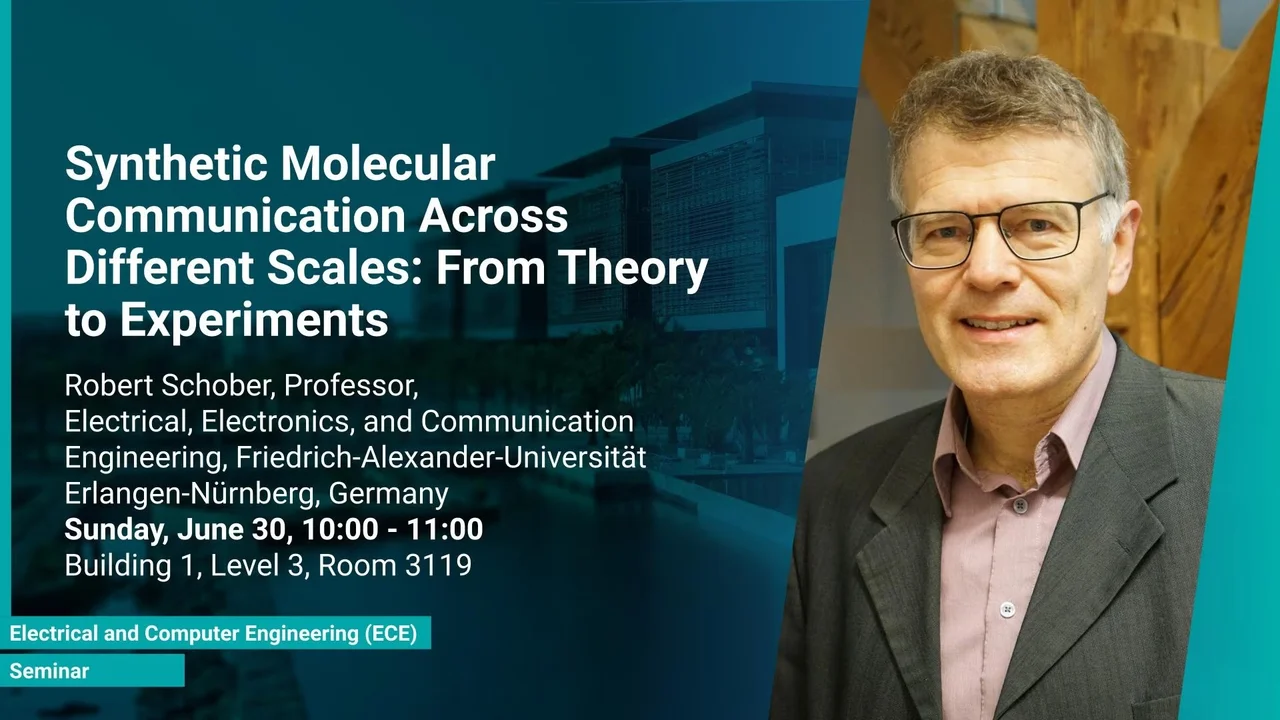
Synthetic Molecular Communication Across Different Scales: From Theory to Experiments
- Robert Schober
B1 L3 R3119
In this talk, we will provide a critical analysis of the state of the art in MC research and outline the training and research program of SyMoCADS with the objective of inspiring similar programs elsewhere.
Overview
Abstract
Over the past 15 years, the interest in Synthetic Molecular Communications (MC) has steadily increased and many important contributions have been made. Nevertheless, most of the work on MC is still theoretical in nature and far removed from practical applications. An important reason for this is the inherent interdisciplinarity of the field of MC, which has slowed down the progress of the field.
To overcome these limitations, the German Research Foundation has recently funded the Research Training Group “SyMoCADS - Synthetic Molecular Communication Across Different Scales: From Theory to Experiments” involving 10 PIs from 6 different disciplines. The aim of this project is to provide over a period of 9 years 27 Ph.D. students and 3 postdoctoral fellows the interdisciplinary, research-oriented training needed to move MC forward to the realm of applications. The targeted application areas include bioprocess engineering, targeted drug delivery, and odor design.
In this talk, we will provide a critical analysis of the state of the art in MC research and outline the training and research program of SyMoCADS with the objective of inspiring similar programs elsewhere.
Brief Biography
Robert Schober received the Diplom (Univ.) and Ph.D. degrees in electrical engineering from the Friedrich-Alexander University of Erlangen-Nuremberg (FAU), Germany, in 1997 and 2000, respectively. From 2002 to 2011, he was a Professor and a Canada Research Chair at the University of British Columbia (UBC), Vancouver, Canada. Since January 2012, he has been an Alexander von Humboldt Professor and the Chair of Digital Communication with FAU. His research interests fall into the broad areas of communication theory, wireless and molecular communications, and statistical signal processing.
He received several awards for his work, including the Heinz Maier-Leibnitz Award of the German Science Foundation in 2002, the Innovations Award of the Vodafone Foundation for Research in Mobile Communications in 2004, a 2006 UBC Killam Research Prize, the Wilhelm Friedrich Bessel Research Award of the Alexander von Humboldt Foundation in 2007, the Charles McDowell Award for Excellence in Research from UBC in 2008, Alexander von Humboldt Professorship in 2011, a NSERC E.W.R. Stacie Fellowship in 2012, the Wireless Communications Recognition Award by the IEEE Wireless Communications Technical Committee in 2017, and the IEEE Vehicular Technology Society Stuart F. Meyer Memorial Award in 2022. Furthermore, he received numerous Best Paper Awards for his work, including the 2022 ComSoc Stephen O. Rice Prize and the 2023 ComSoc Leonard G. Abraham Prize. Since 2017, he has been listed as a Highly Cited Researcher by the Web of Science. He is a Fellow of the IEEE, Canadian Academy of Engineering, and Engineering Institute of Canada and a Member of the German National Academy of Science and Engineering.
He served as the Editor-in-Chief of the IEEE Transactions on Communications, VP Publications of the IEEE Communication Society (ComSoc), a ComSoc Member at Large, a ComSoc Treasurer, and Chair of the Steering Committee of the IEEE Transactions on Molecular, Biological, and Multiscale Communication. He currently serves as a Senior Editor of the Proceedings of the IEEE and as ComSoc President.